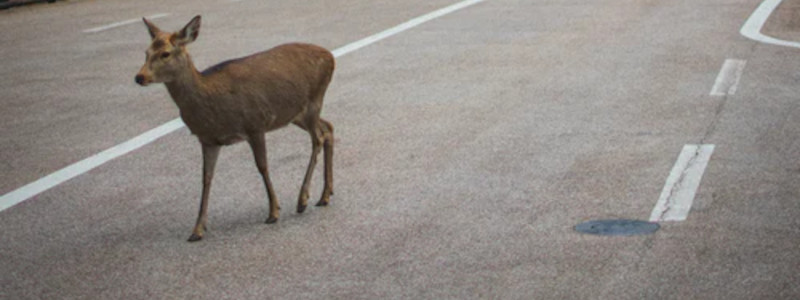It’s important that you avoid wildlife vehicle collisions on the road while you travel. Thousands of animals lose their lives on roads across the UK every year. Hitting wildlife when you’re driving is also incredibly distressing and can cause damage to your vehicle as well as serious road accidents.
There are lots of actions that you can take to prevent animal road accidents as you’re travelling.
Reduce speed at night
When you’re driving in the dark in areas you’re likely to encounter wildlife in the road, reduce your speed. Going a little slower will give you greater reaction time to prevent a collision.
Use your horn
If you can see an animal by the side of the road, honk your horn as you approach. This should cause the animal to run away to safety away from the road.
Take a look at some of these weird driving laws you might break every day.

Don’t like driving in the dark? Our tips make it much easier.
Flash your lights
If it is safe to do so and won’t confuse other road users, flash your lights at the animal. The beam from your headlights can be hypnotic to animals, so by flashing, you should break the spell and allow them to run away.
Install a warning system on your car
If you live in a rural area or somewhere with lots of animals likely to be near the road, you can install a warning system on your car. These typically work by emitting a high-pitched noise the animal’s superior hearing can pick up on, but ours cannot.
This sound should deter them from coming anywhere near you as you drive. They make noise only when the car is moving and air is flowing through the device. If you’re going to buy one, make sure you check out reviews, as there are cheap alternatives on the market that aren’t effective.
Leave space
Leave plenty of space and don’t follow closely behind other vehicles on the road. You never know if the car in front might break or swerve to avoid an animal in the road that you haven’t seen. You’ll need time and space to be able to react appropriately.
Feeling tired or distracted behind the wheel? Take a look at these tips for avoiding driver fatigue.

Travelling with your own pets in the car? Check out these tips for keeping them safe.
If a collision is unavoidable
If a collision with an animal in the road is unavoidable, try to use to your breaks to lessen the damage. Upon impact, ease off the break so that the front of your car isn’t dipped down. This will help prevent the animal from being forced up onto your bonnet and windshield.
You should also try and lean towards the door rather than the centre of the vehicle. In a head on collision, the animal might roll over the vehicle, causing damage to the middle of the windshield or roof. Leaning away will help protect yourself.
If it’s a large animal, make sure you report it to the police straightaway. That way, they can come and tend to the animal and give you an incident report. This will help you with any insurance claim if one is necessary.
The RSPCA are on hand to help out with injured animals. If you can see that the animal has survived the impact, give them a call on 0300 1234 999. For your own safety, don’t approach the creature as it doesn’t know you’re trying to help and can lash out.
Stay safe
When you’re on the road, especially in the early morning or late at night, be prepared for more wildlife to be around. Act as best you can to protect yourself, your passengers and to prevent wildlife vehicle collisions.
We have a great range of vehicles available to hire if you’re planning a trip. View our hire cars and get in touch today.
